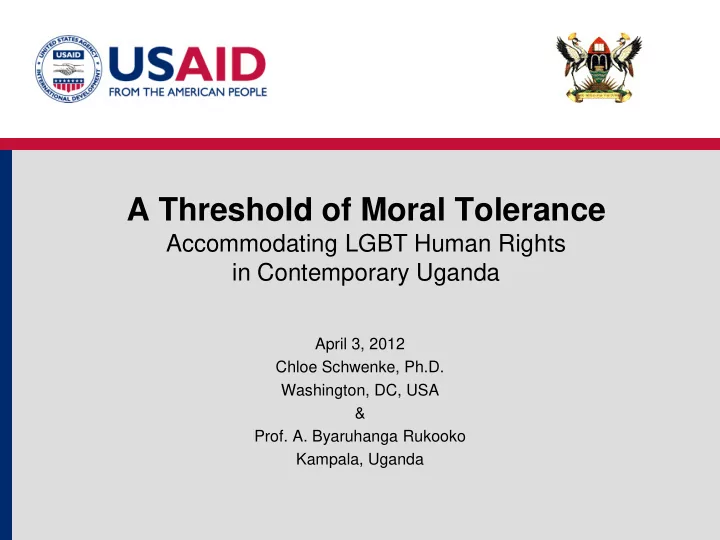

A Threshold of Moral Tolerance Accommodating LGBT Human Rights in Contemporary Uganda April 3, 2012 Chloe Schwenke, Ph.D. Washington, DC, USA & Prof. A. Byaruhanga Rukooko Kampala, Uganda
Dialogue Denied, or Dialogue of Confusion • What threshold must be reached to create a deliberative space within Uganda sufficient to overcome the conflict over LGBT human rights? – A forbidden dialogue? – LGBT human rights or LGBT sex? – LGBT = A vulnerable minority to be protected, or a perverse phenomenon to be rejected? – Transgender = Affront to immutable gender boundaries, or about reality of gender dissonance? – Human nature = A question of human diversity? A negation of fundamental human traits? – LGBT = A natural part of the “human condition”, or a perversion of the human condition?
LGBT! What are people (or governments) reacting to? • Cultural views about gay, lesbian, or bisexual sexual behavior, or status? – Homophobia/transphobia? – A “lifestyle”? A choice? A human right? • Moral and legal permissibility • Extreme self-indulgence, rejecting societal norms? • Perplexed? Confounded? • Lack of objective information
LGBT claims, supported by universal human rights based values • Right to free association • Right to identity (transgender) • Right to privacy • Right to authenticity (i.e. LGBT not a choice)
Traditional Ugandan claims • Homosexuality is abnormal, unintelligible, unnatural • Heterosexuality divinely ordained for procreation, and procreation is valued • Gender identity immutable, unless medically problematic • Not integral to traditional African morality, hence foreign and a threat • An individualistic imposition on higher priority communal collective norms
Resolving the conflict of values • Nature of conflict = universal values (human rights) versus relative (cultural) values • Possibility of deliberation to reach a resolution – Assertion = a threshold of tolerance is a prerequisite for deliberation – Constructive, respectful engagement or stigmatized rejection? • Normalization of LGBT status? – Part of the human condition & no harm to society (USA) – Stigmatized aberration of the human condition = a culture of silence (Uganda)
Uganda ~ what about the quality of the deliberation intended to resolve the clash of moral values? • Poor or no information • Overcoming stigmatization – Pervasive silence • Lack of a shared commitment to achieving a deliberative consensus • A few attempts at a structured dialogue • Universalist claims or endangered cultural identity?
Cultural relativism regarding human rights validity • Radical/Strong/Weak = culture as sole/principle/important determinant of validity • Social compact as a basis for human rights universality • Human rights as a reaction to human wrongs, injustices • Human rights as situated in ethical communities (parents, poor, women, LGBT)
Metaphysical grounding of human rights • Natural law – Chris Brown, Tim Dunne, Nicholas Wheeler • Cultural attitudes and beliefs – Richard Rorty, F. Kasozi, Sango Mwanahewa • Indicative of a functioning ethical community • Human dignity/ “okra - dignity” or divine element/ “obuntu” • As means and/or ends? – Prerequisite or by-product?
Conclusion • Looking ahead in Uganda, near term: – Relativistic moralizing/moral extremism versus universal rigid moral prescriptionism • Prospect of achieving critical threshold of tolerance, longer term – Must be sufficient for a deliberative process to reassess values and reach a stable consensus – Dependent on societal investment in a shared sense of the meaning of “human dignity” – Will not be achieved soon…
Recommend
More recommend